Introduction
In a world where connections can make or break a business, finding the right leads is more crucial than ever. According to a recent report by Salesforce, 70% of sales professionals believe that AI can significantly enhance the lead generation process.
That’s a game-changer! With the rise of AI lead generation, companies can now tap into smarter ways of identifying and engaging potential customers, ensuring they focus their energy where it truly counts.
Imagine being able to effortlessly sift through tons of data to find the prospects most likely to convert—all while saving your team valuable time and effort. This isn’t just a fantasy; it’s the reality of AI tools at work today.
Join us as we explore the exciting world of AI lead generation, where technology meets strategy to help you connect with your ideal customers like never before.
Let’s uncover the best practices and tools that can elevate your AI lead generation game!
What is AI Lead Generation?
AI lead generation is redefining the way marketers find and connect with prospects through the use of artificial intelligence to streamline and improve lead-acquisition practices.

Though old techniques that focus on volume-based AI lead generation solely through methods like cold calling and generic email marketing have traditionally dominated the industry, AI lead generation employs data-driven strategy, ensuring businesses identify the right prospect at the right time and with the right message.
That shift to AI lead generation turned the rules of the game for many companies. According to Salesforce, companies using AI for lead generation have sales opportunity output that is 50% higher, whereas closing rates are 60% faster, compared to their peers.
That speed and efficiency come often from AI-powered capabilities to automate routine processes, analyze vast datasets, and predict which leads will convert the best.
Two major differences lie between AI lead generation and other traditional methods in terms of the speed and accuracy.
AI tools can hasten enormous amounts of data processing activities that could help trace patterns showing potential customer interest, thus saving many hours spent chasing unqualified leads. Efforts can then be focused on people with a greater chance of conversion, leading to increased efficiency overall.
Key AI Technologies Used in AI Lead Generation
Several cutting-edge AI technologies are integral to effective AI sales AI lead generation
- Machine Learning (ML) This technology enables AI systems to learn from past interactions and outcomes, continually refining their targeting and predictions over time.
For example, tools like HubSpot employ ML algorithms to optimize lead scoring and segmentation, ensuring marketers focus on the most promising leads.
- Natural Language Processing (NLP) With NLP capabilities, AI can comprehend and respond to human language effectively.
This enhances the functionality of chatbots for lead generation, allowing them to engage with potential customers naturally and meaningfully. BotPenguin, for instance, uses advanced NLP to interact with leads, answer queries, and guide users through the sales funnel.
- AI Lead Generation Software These tools integrate both ML and NLP technologies to streamline the entire lead generation process—from identifying prospects to closing sales. Software like Pipedrive automates the tracking and scoring of leads, significantly improving efficiency.
Benefits of AI in Lead Generation
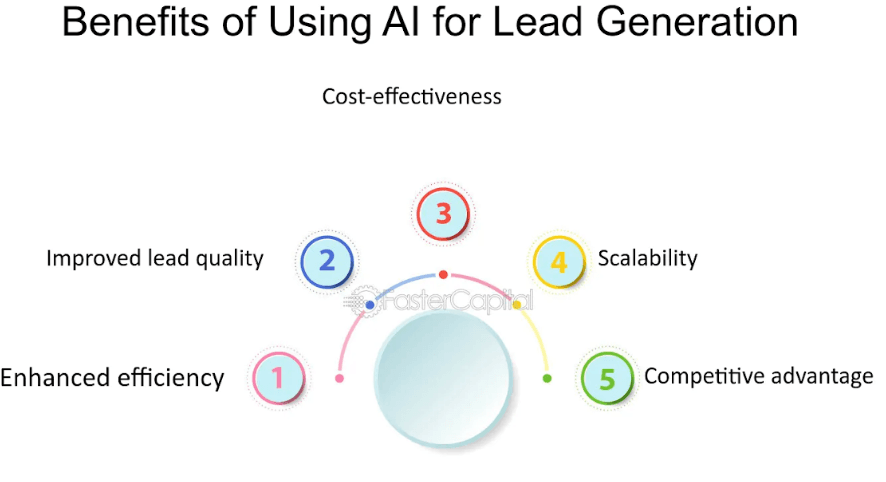
AI lead generation is a transformative force for businesses, providing numerous advantages over traditional strategies.
Improved Accuracy in Targeting Potential Leads
AI tools can scrutinize extensive datasets to detect behaviors and patterns indicative of interest, allowing businesses to precisely identify their target audience.
For example, LinkedIn Sales Navigator uses AI to suggest high-quality leads based on user-defined criteria, ensuring that marketing efforts are efficiently directed.
Faster Data Analysis and Insights
The ability of AI to process vast amounts of data in seconds delivers real-time insights, a significant advantage over traditional methods that might require days for analysis.
AI lead generation software enables immediate adjustments based on current data, facilitating timely decision-making.
Personalized Lead Nurturing
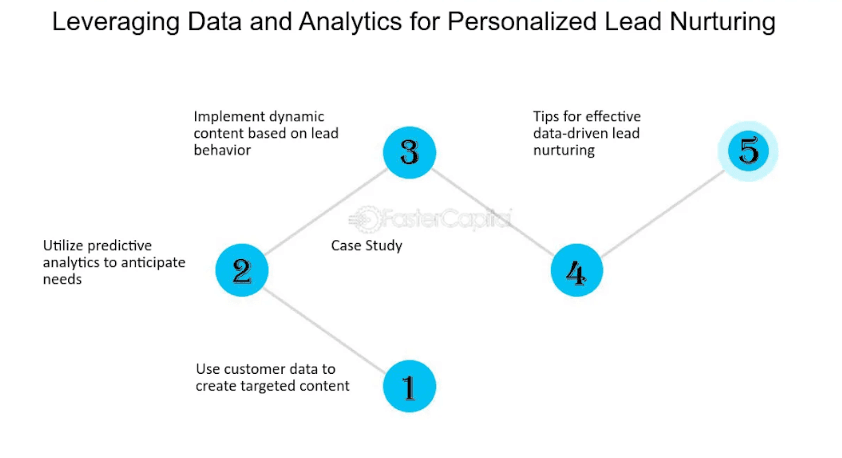
AI’s capability to understand customer preferences allows businesses to create highly personalized campaigns.
Whether through tailored email outreach or interactive chatbots for lead generation, AI ensures that prospects receive relevant information when they need it.
Companies like Shopify use AI-driven emails to send personalized product recommendations based on user behavior.
Better Conversion Rates
With enhanced targeting and personalized communication, businesses leveraging AI for lead generation often experience significantly higher conversion rates.
AI allows firms to prioritize high-potential leads, boosting the likelihood of converting them into loyal customers while minimizing wasted efforts.
How AI Enhances Each Stage of Lead Generation
AI facilitates every stage in the lead generation process, from automation to data-driven insights and communication strategies that match each prospect.
Organizations can simplify workflows, be better targeted, and ultimately, more efficient when they adapt AI lead generation. From identification to conversion, AI enables each step to be faster and more effective in a lead generation process.
Lead Identification
AI plays a crucial role in lead identification by analyzing vast datasets to spot patterns and behaviors. AI for lead generation algorithms can evaluate customer interactions, demographics, and online behavior to pinpoint leads with high buying intent.
This not only minimizes guesswork but ensures businesses concentrate on the right audience, much like Marketo, which utilizes AI to optimize lead identification.
Lead Scoring
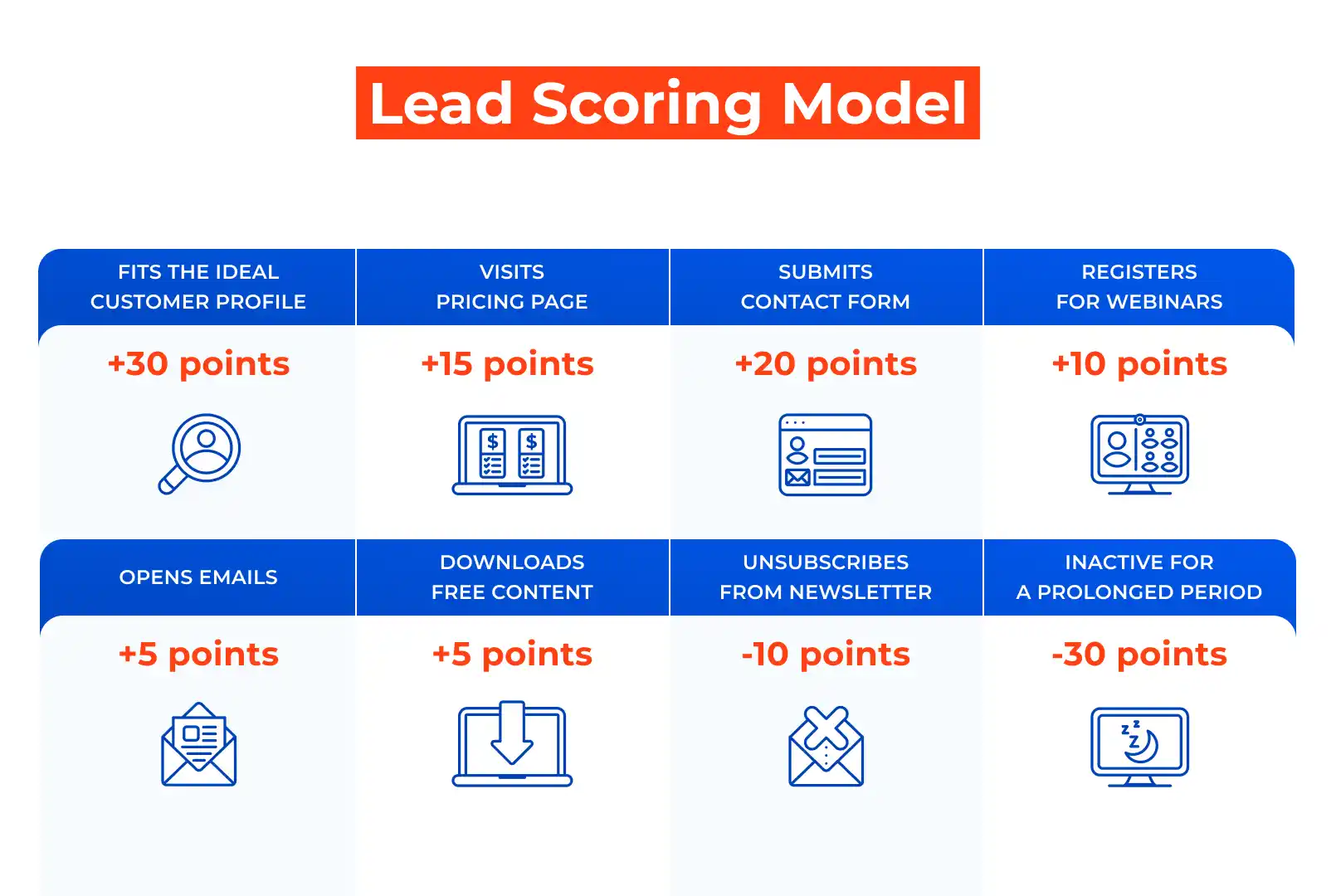
Once leads are identified, AI-powered lead scoring systems come into play to prioritize leads based on their likelihood to convert. These predictive models assess factors such as engagement levels, historical behavior, and interaction history.
For instance, Zoho CRM employs AI to score leads effectively, enabling businesses to allocate their resources more strategically toward high-priority prospects.
Lead Nurturing
AI enhances lead nurturing through personalized interactions at scale. AI-driven solutions like a chatbot for lead generation can engage prospects 24/7, addressing inquiries and guiding them through the sales journey.
Automated email campaigns, triggered by user actions, facilitate ongoing communication. For example, BotPenguin offers a chatbot that nurtures leads by providing tailored responses and recommendations based on user input.
Lead Qualification
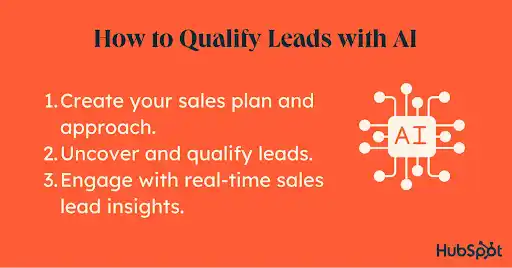
Not every lead warrants pursuit, and this is where AI can shine. AI lead generation software assesses leads based on various criteria, such as buying behavior, budget, and decision-making authority.
By automating this qualification process, AI eliminates the need for manual screening, allowing businesses to swiftly identify viable leads. This efficiency ensures that sales teams concentrate on prospects with genuine potential.
Lead Engagement
AI transforms lead engagement by automating interactions across multiple channels. From tailored messaging on social media to strategic follow-ups, AI for lead generation ensures consistent engagement.
AI tools analyze a prospect’s behavior and customize communications accordingly, enhancing the likelihood of conversion. Companies like Drift use AI to maintain real-time engagement, ensuring that no opportunity is overlooked.
Lead Retention and Reactivation
Apart from conversion, AI also plays a significant role in retaining and reactivating customers.
Lead generation tools that use AI track the behavior post-conversion so that the business receives timely intimation regarding potential churn risks so that it can react with relevant offers or follow-up messages.
AI can even help to be reactivated to inactive leads based on prior interactions and incentives used. This is how such an approach will help retain the customers easily, and success comes in the long run.
Lead Conversion
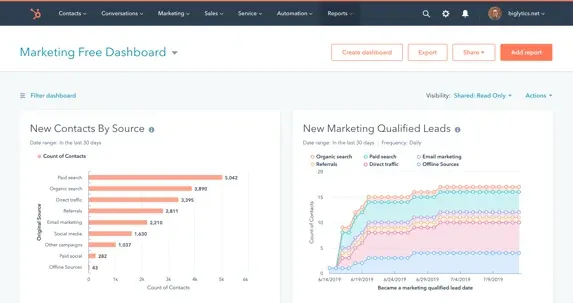
The conversion stage also happens to be very vital, and AI does really excel in this particular area. From full-funnel customer data, AI provides an insight into what works and what doesn't or what should be done better.
AI lead generation software can identify which tactics drive conversions and which need an adjustment. For instance, companies like HubSpot make use of AI analytics to not just improvise on their conversion strategy but also make informed decisions to optimize sales outcomes.
Key AI Tools for Lead Generation
AI is fundamentally transforming how businesses find and engage potential customers, with a variety of specialized tools designed for effective AI lead generation.
These tools not only automate repetitive tasks but also analyze vast amounts of data to personalize communication, making lead generation more efficient and impactful.
Selecting the right AI tools can significantly enhance how businesses identify, nurture, and ultimately convert leads.
Common AI Tools for Lead Generation
Several AI tools are pivotal in AI sales lead generation, each serving distinct yet complementary functions
Chatbots for Lead Generation
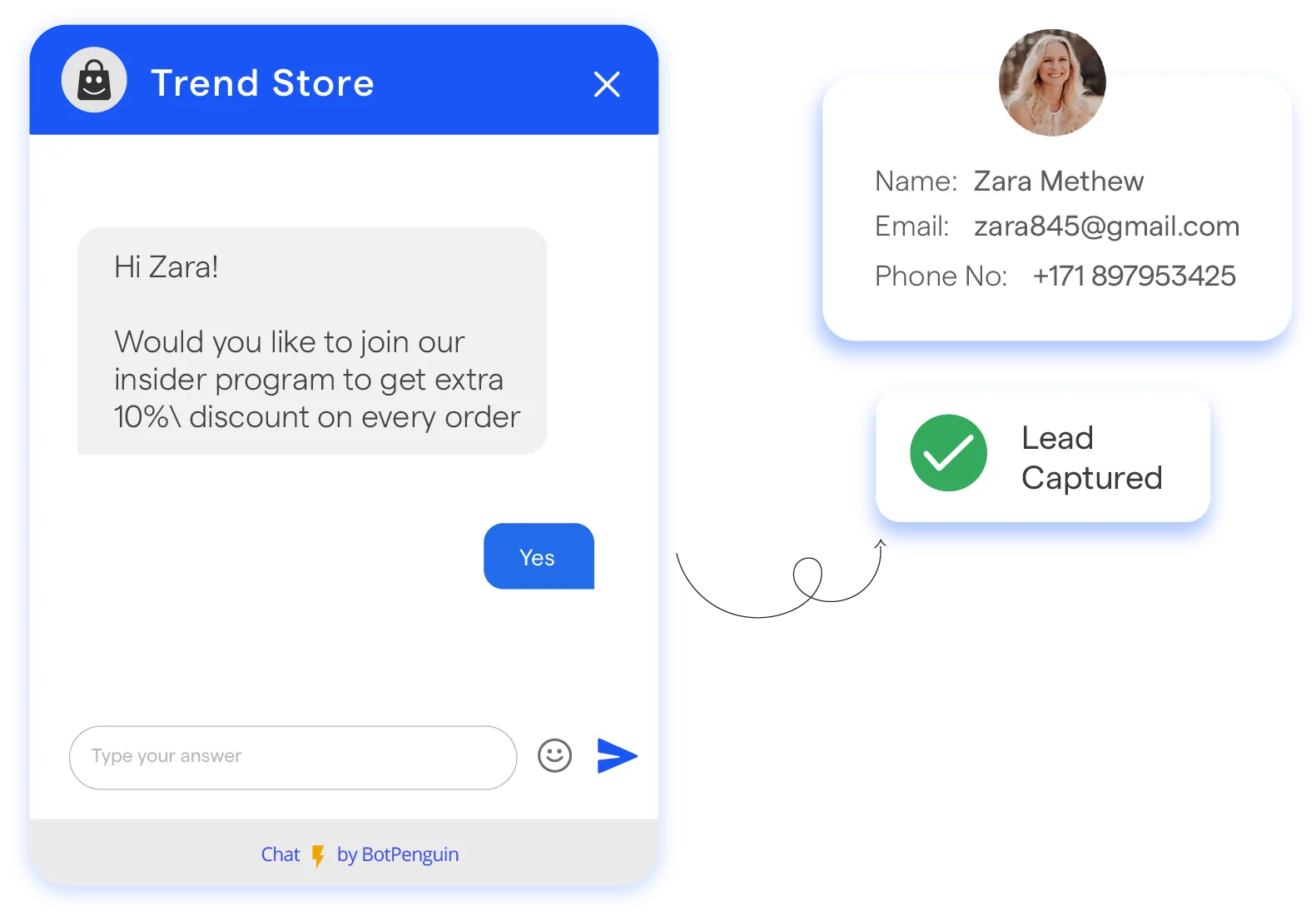
These intelligent tools engage with website visitors in real-time, answering questions, gathering contact information, and guiding prospects through the sales funnel. With 24/7 availability, chatbots make AI for lead generation accessible at any time.
For example, a company like BotPenguin utilizes its chatbot to automate customer interactions, ensuring that potential leads receive immediate responses to their inquiries, which boosts engagement and drives conversions.
CRM Software
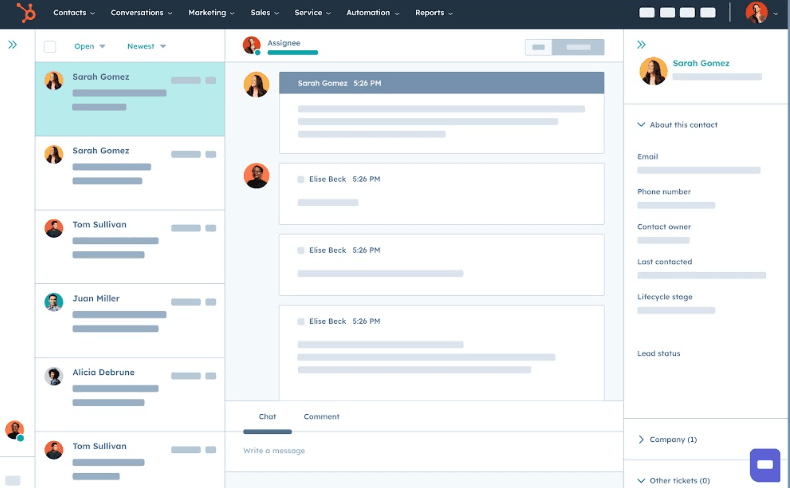
AI-powered Customer Relationship Management (CRM) systems analyze customer data and interactions to offer insights into the best ways to engage leads.
Tools like HubSpot and Salesforce Einstein help sales teams prioritize their outreach efforts effectively.
By examining previous interactions and customer behavior, these CRMs ensure that sales teams focus on leads that are more likely to convert.
Email Automation
AI tools also automate email campaigns, sending personalized content to leads based on their behavior and preferences. This keeps leads engaged without the need for constant manual intervention.
Marketo, known for its powerful email automation capabilities, uses AI to tailor email messages, ensuring that leads receive relevant information at the right moment in their buyer's journey.
How Each Tool Contributes to Generating Leads
Each tool in the AI lead-generation landscape plays a distinct role in creating a seamless and effective lead-generation process
- Chatbots initiate conversations, qualify leads, and collect essential information, significantly speeding up the lead identification process.
- CRM software organizes and prioritizes leads based on data-driven insights, helping sales teams focus their efforts where they are most needed.
- Email automation nurtures leads through tailored messages, fostering stronger relationships and guiding prospects down the sales funnel.
Importance of Selecting the Right AI Tool
The right AI tool is essential to optimal lead generation in sales with AI. Every company has a different need, so the selected tools must be directly relevant to specific goals.
For instance, a company with a strong focus on real-time engagement with the customer can go for the lead generation chatbot more if their system is used for real-time engagement.
Advanced analytics would be preferred when advanced analytics is required and in-depth analytics are required such as the Salesforce Einstein system of CRM.
Evaluating the requirements of a business helps ensure that the selected AI tools provide the most efficient outputs. This leads to the strengthening of lead generation effectiveness.
Overview of Popular AI Tools
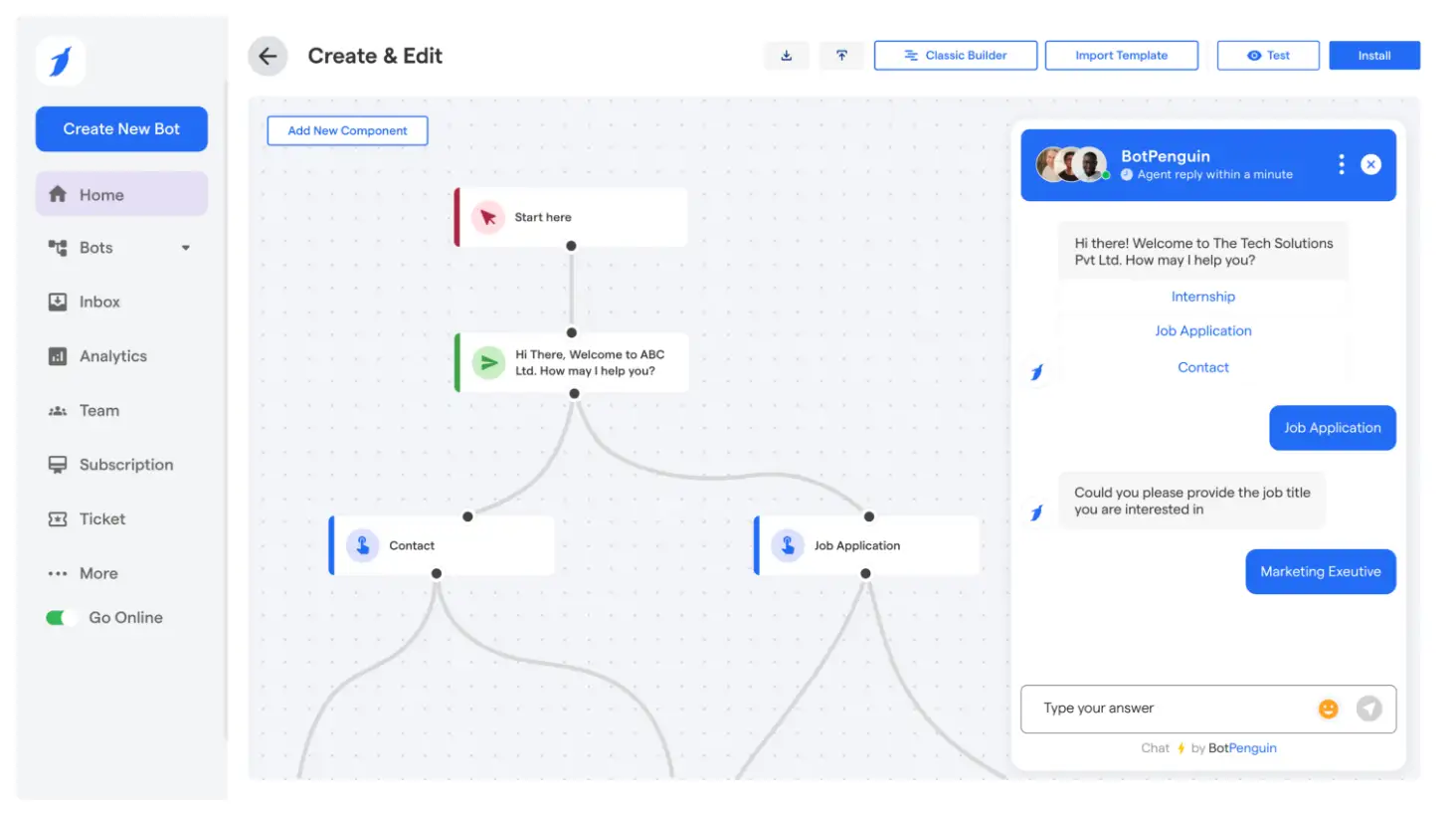
Several AI-powered tools are popular choices for lead generation, each with its own strengths.
- BotPenguin: As a powerful chatbot for lead generation, BotPenguin facilitates personalized conversations, automating interactions while collecting valuable lead data to enhance engagement.
- HubSpot: This all-in-one CRM platform integrates AI capabilities, automating marketing, sales, and customer service processes, making it ideal for businesses looking to streamline their operations.
- Salesforce Einstein: Integrated within the Salesforce ecosystem, Einstein leverages AI to provide predictive analytics and insights, empowering businesses to make informed decisions on which leads to target.
- Marketo: Renowned for its robust email automation features, Marketo utilizes AI to personalize email campaigns, ensuring leads receive the right message at the optimal time.
AI and Data-Driven Lead Targeting
AI has revolutionized how businesses approach lead generation by harnessing data for precise audience targeting.
With AI lead generation, companies can analyze extensive datasets to segment their audiences, predict behaviors, and focus on high-potential leads.
This leads to more targeted marketing efforts and improved conversion rates.
Analyzing Data to Segment Audiences
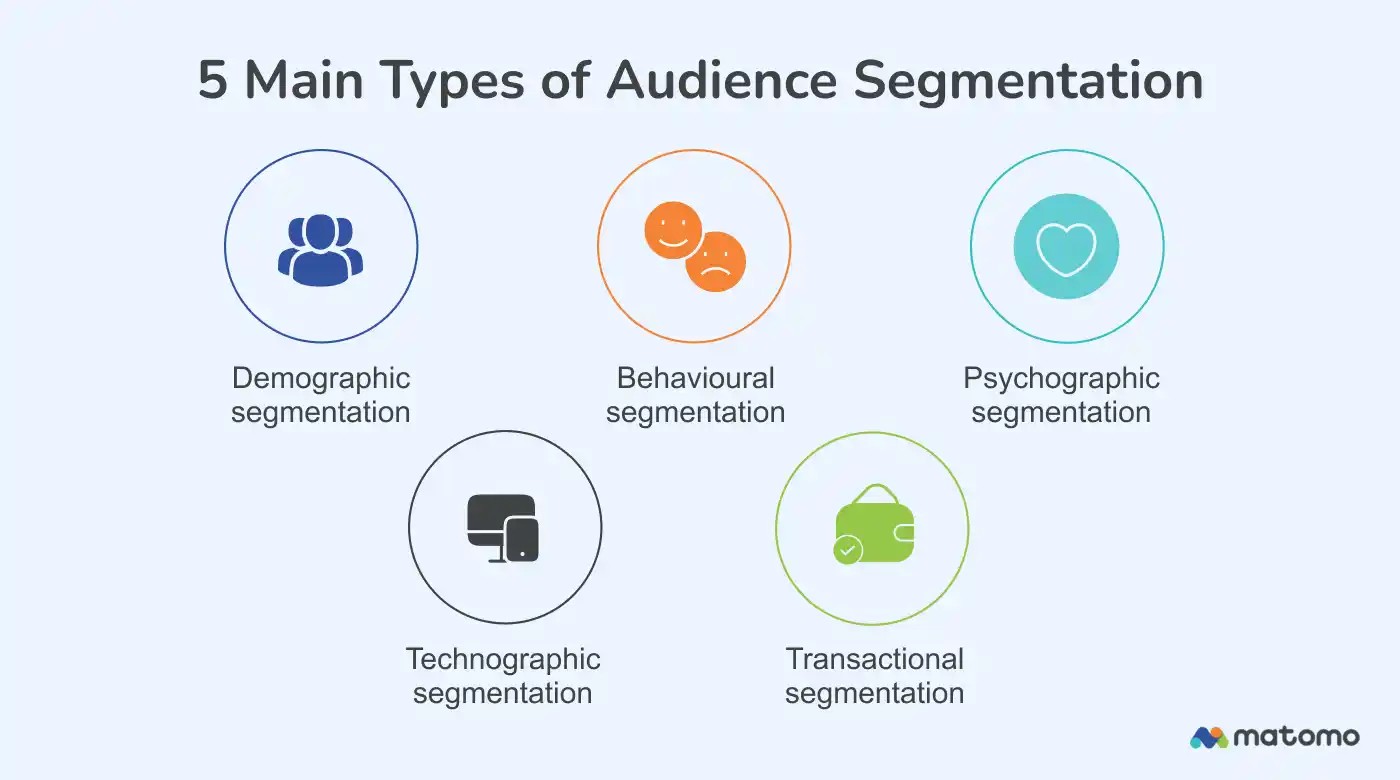
AI for lead generation employs advanced algorithms to process and analyze substantial volumes of customer data. This capability allows businesses to segment their audiences based on specific factors like behavior, demographics, and buying patterns.
For example, a retail company might use AI tools to identify segments of customers who are most likely to purchase based on their browsing history and past purchase behavior, resulting in targeted marketing campaigns that significantly enhance engagement.
Predictive Analytics in Lead Scoring
Predictive analytics play a crucial role in AI sales lead generation. AI models assess past interactions, behaviors, and patterns to score leads based on their likelihood to convert.
This data-driven approach allows businesses to prioritize leads more effectively and focus on those with the highest potential.
For instance, a SaaS company can implement predictive scoring to identify which leads have shown consistent interest over time, allowing their sales team to focus their efforts on leads that are most likely to result in new customers.
Focusing on High-Potential Leads
By concentrating on high-potential leads, AI lead generation software ensures that marketing and sales teams don’t waste time on uninterested prospects.
AI-driven lead targeting enables businesses to allocate their resources more efficiently, increasing overall productivity.
Tools like chatbots for ai lead generation and predictive analytics enhance lead engagement and retention, making the entire ai lead generation process more effective.
By focusing efforts where they are likely to yield the best results, businesses can achieve higher conversion rates and foster long-lasting customer relationships.
Best Practices for Using AI in Lead Generation
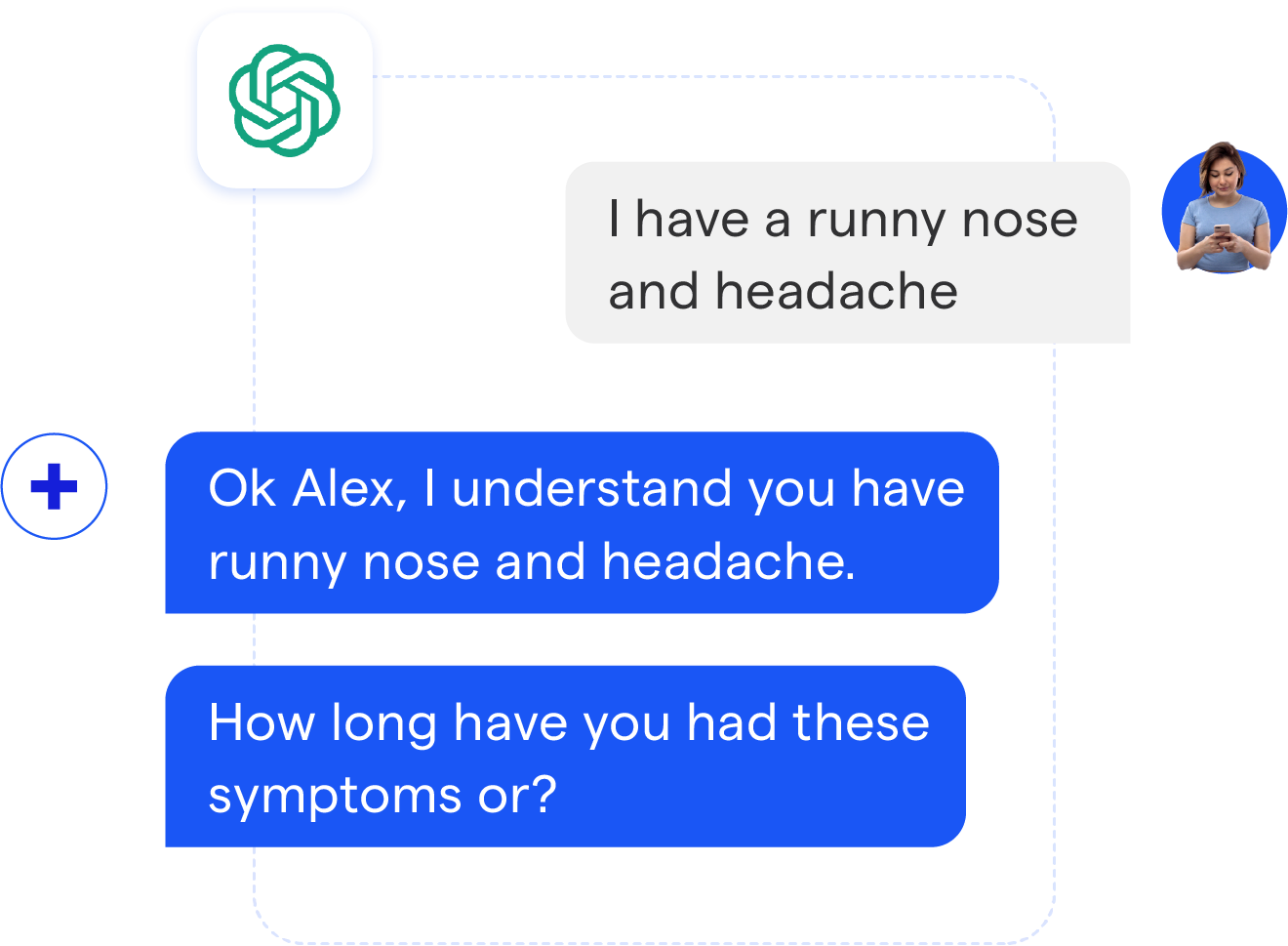
To harness the full potential of AI lead generation, adhering to best practices is crucial.
These guidelines ensure that AI tools, such as chatbots for lead generation and AI lead generation software, deliver optimal results and align with your business goals.
Start with Clear Goals and Objectives
Get clear objectives before you leap into AI for lead generation. As specific as possible on the goals in hand is it an increase in the volume of leads generated, quality improvement, or boost in conversion rates? That will set a roadmap for the efforts directed toward that.
For instance, if you wished to improve the quality of leads, you'd implement AI lead generation bot with lead qualification procedures that include predefined criteria and pass them on to sales. Defining clear goals helps you choose the right AI tool and also measure your efficiency in the long run.
Continuously Monitor and Optimize AI Models
It is not a set-it-and-forget solution, especially for AI models. They need constant monitoring and optimization to keep them effective. You should review your AI sales lead generation tools regularly to ensure they serve your objectives.
For instance, if your predictive analytics model is not scoring leads correctly then you have to repeat that calculation and would need to train it with additional data again.
Thus, optimizing algorithms and settings according to real-time insights improves the accuracy and effectiveness of your tools. This continuous optimization will help in keeping the relevance and performance as the business evolves.
Suggested Reading:
How to use Generative AI for Lead Generation?
Train Your Team to Work Effectively with AI Tools
Your team would be at the center of your AI lead generation strategy. Therefore, making sure that they understand how to properly use AI tools is vital.
Helping them get better over time would indeed go a long way if you can train them fully on how to work with AI lead generation software, interpret the data, and integrate AI insights into the ai lead generation strategy.
For instance, one can orient training on the use of chatbots to capture key information of customers through ai lead generation or other segments such as strategies on how to make the best use of CRM analytics for ai lead segmentation.
Trained employees can therefore fully reap the benefits of AI as data turns into actionable insights that would yield success in ai lead generation.
Challenges and Solutions
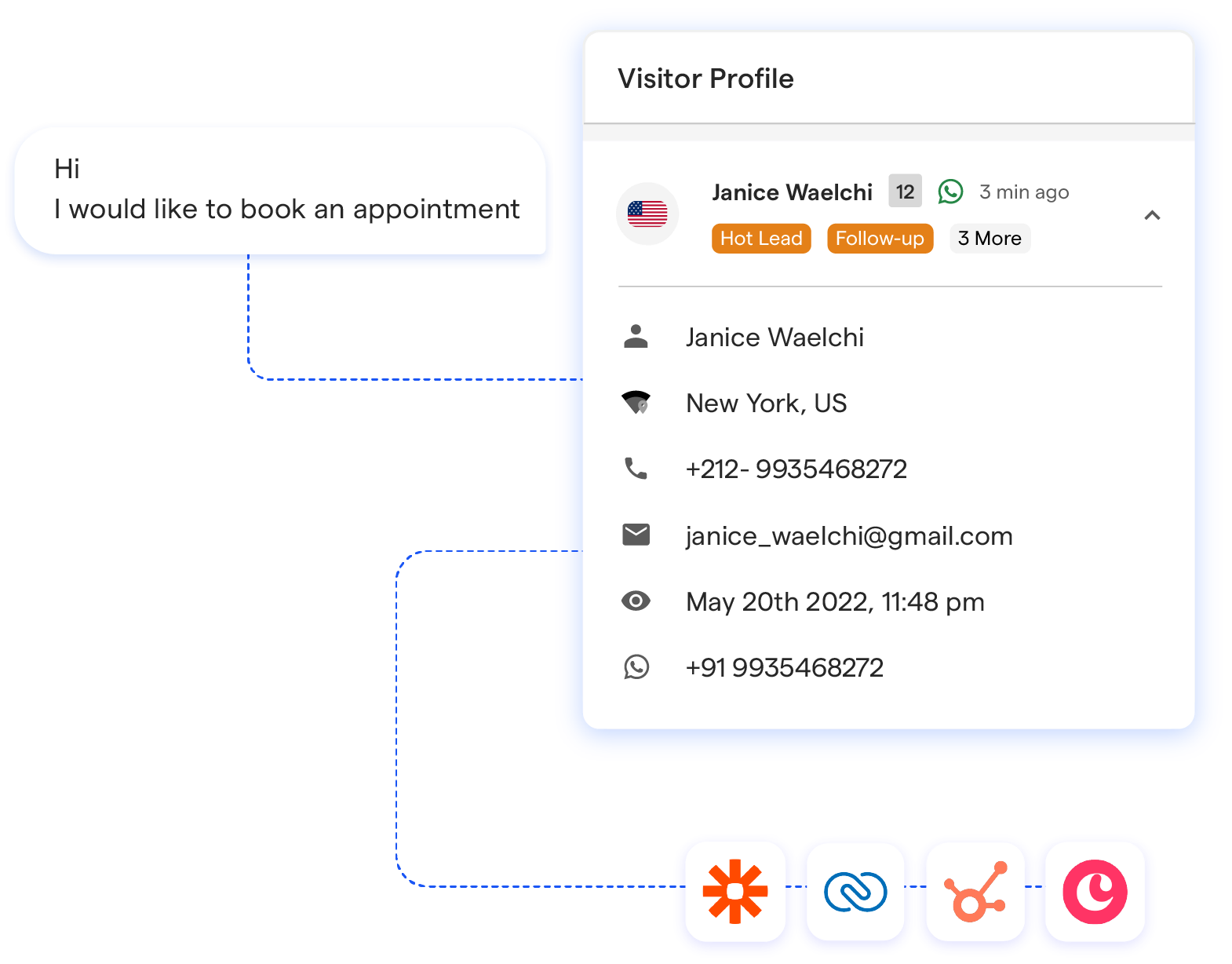
While implementing AI lead generation can enhance your marketing efforts, various challenges may arise. Here’s an overview of common issues along with practical solutions
Data Quality Issues
The following are issues faced in AI lead generation for data quality
- Challenge Poor or incomplete data can severely impair the effectiveness of AI for lead generation. Inaccurate data leads to misinformed decisions and can undermine the entire AI lead generation process.
- Solution Invest in robust data cleaning and validation processes. Regularly auditing and enriching your data ensures accuracy and reliability, allowing your AI tools to function optimally.
For example, using data enrichment services can help fill in gaps in customer profiles, enhancing the data fed into your AI models.
Integration Difficulties
The following are issue faced in AI lead generation for integrations
- Challenge AI tools might struggle to integrate seamlessly with existing systems, leading to workflow disruptions and inefficiencies. If the integration is complicated, it may result in user frustration and underutilization of the AI tools.
- Solution Choose AI lead generation software that offers easy integration with your existing tech stack. Look for tools that provide comprehensive API support or plug-and-play functionality. Collaborating with your IT team during setup can also facilitate smooth integration and ensure that all systems communicate effectively.
User Adoption Resistance
The following are issue faced in AI lead generation for user adoption
- Challenge Teams may resist adapting to new AI tools or may lack the necessary skills to utilize them effectively. This can lead to a disconnect between the intended use of the tools and actual practice.
- Solution Provide thorough training programs and clear instructions to help teams adapt to AI tools, such as chatbots for ai lead generation.
Create a supportive environment that encourages experimentation with the tools and provides ongoing assistance. Sharing success stories from early adopters within your organization can also motivate others to engage with the technology.
Conclusion
In today’s competitive landscape, leveraging AI for lead generation is no longer just an option; it's a necessity for businesses aiming to thrive.
By incorporating best practices—such as setting clear goals, continuously optimizing AI models, and training teams to utilize AI tools effectively—companies can significantly enhance their AI lead generation strategies.
By making use of innovative solutions like leads through chatbots and AI-based software for lead generation, businesses can now engage with prospects in an intelligent and efficient manner.
The process streams these technologies encourage and produce insights that guide companies in focusing on leads that have a higher potential. With changes happening as businesses tap into the power of AI, they can expect improved quality leads, higher conversion rates, and steady growth.
In short, the successful assimilation of AI into processes in lead generation will redefine how businesses interact with their target audience and thus become part of any modern marketing campaign.
Frequently Asked Questions (FAQs)
Can AI Sales Lead Generation tools nurture prospects effectively?
Yes, AI Sales Lead Generation tools automate personalized follow-ups through emails and chatbots, nurturing prospects with tailored content and guiding them down the sales funnel seamlessly.
Are AI Sales Lead Generation tools suitable for B2B marketing?
Absolutely! AI Sales Lead Generation tools are ideal for B2B, as they can prioritize high-value leads, segment audiences, and provide personalized recommendations to drive meaningful engagement.
How can small businesses leverage AI Lead Generation?
Small businesses can use AI Lead Generation tools to automate lead scoring, identify target customers, and streamline their marketing efforts without the need for large teams or budgets.
What industries benefit most from AI Sales Lead Generation?
Industries like real estate, eCommerce, and SaaS see the biggest impact from AI Sales Lead Generation by capturing niche audiences and offering personalized solutions that boost sales.
How does AI Lead Generation integrate with CRM systems?
AI Lead Generation tools seamlessly connect with CRM systems to sync leads, track customer interactions, and provide actionable insights for better lead management and conversions.



